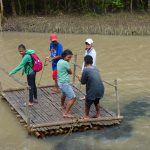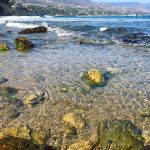
When we insist on shared values and universal human experiences, we erase these productive differences and cripple the potential for equitable collaboration.
environmental economics

When we insist on shared values and universal human experiences, we erase these productive differences and cripple the potential for equitable collaboration.

How do you learn from those with whom you can’t communicate? This question has posed a methodological and ethical quandary as I work on community-based mangrove restoration with Marine Conservation Philippines. My research explores localContinue reading

“Hi Joe!” I hear this cheery call often while doing community-based conservation in the Philippines. Filipinos frequently call foreigners “Joe.” It’s a rich, if casual, reference to the military nature of U.S.-Filipino relations: “Joe” derivesContinue reading

Plastics are accumulating rapidly in our oceans, and the consequences (not just for our beaches, but for the entire ocean ecosystem) are both real and dire. Here are 30 ways to eliminate plastic from your everyday life.

In a year of natural disasters, fires consumed California, followed by terrifying mudslides. We’re woefully underprepared to pay for the consequences of climate change. If ever there was a time to act, it’s now. It’s never been more clear.
There is tremendous growth in wind and solar installations, with good reason—free market economics.

The last thing anyone expects in paradise are GMO testing sites. And yet, vast swaths of the southern part of Kaua’i are becoming just that: open-aired laboratories for some biotech companies.

I don’t know what 2018 has in store, but I know that as long as there are places on the planet worth celebrating and protecting, there will be people throwing their all into the job of doing so. And for that, I’m incredibly grateful.
Trump’s First Year Slightly less than a year ago, I used this blog to provide an open letter to Donald Trump regarding the environment (http://blogs.nicholas.duke.edu/citizenscientist/some-thoughts-for-the-new-president/). My points were simple: Use science to base environmental decisions;Continue reading

For a developing country of 5 million people, Costa Rica’s environmental policies include spectacular feats of long-term thinking and a dedicated commitment to the future.